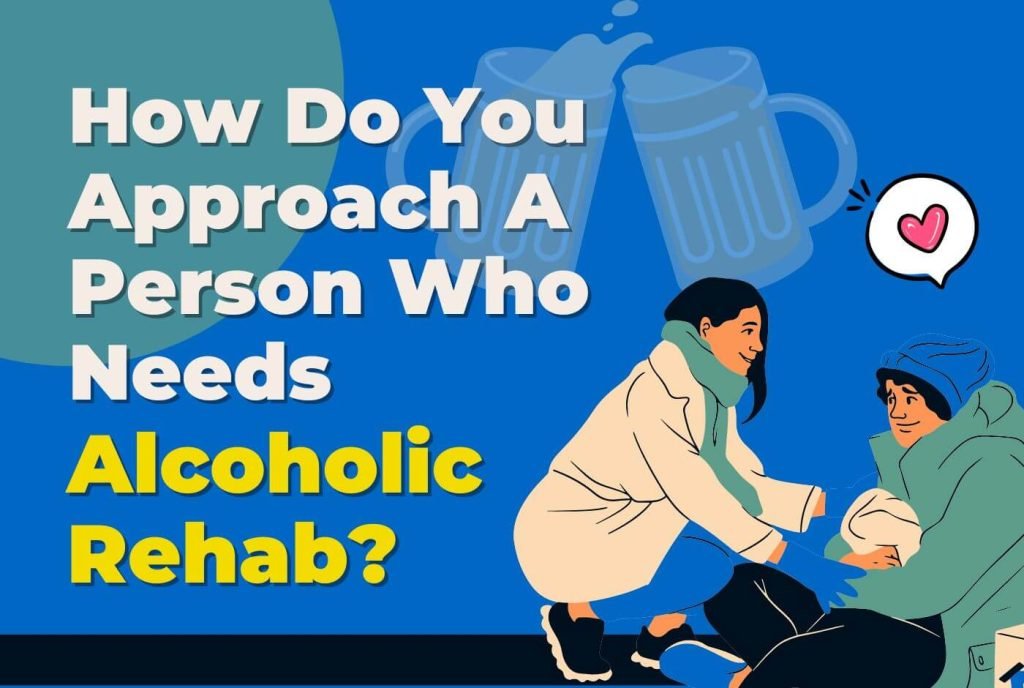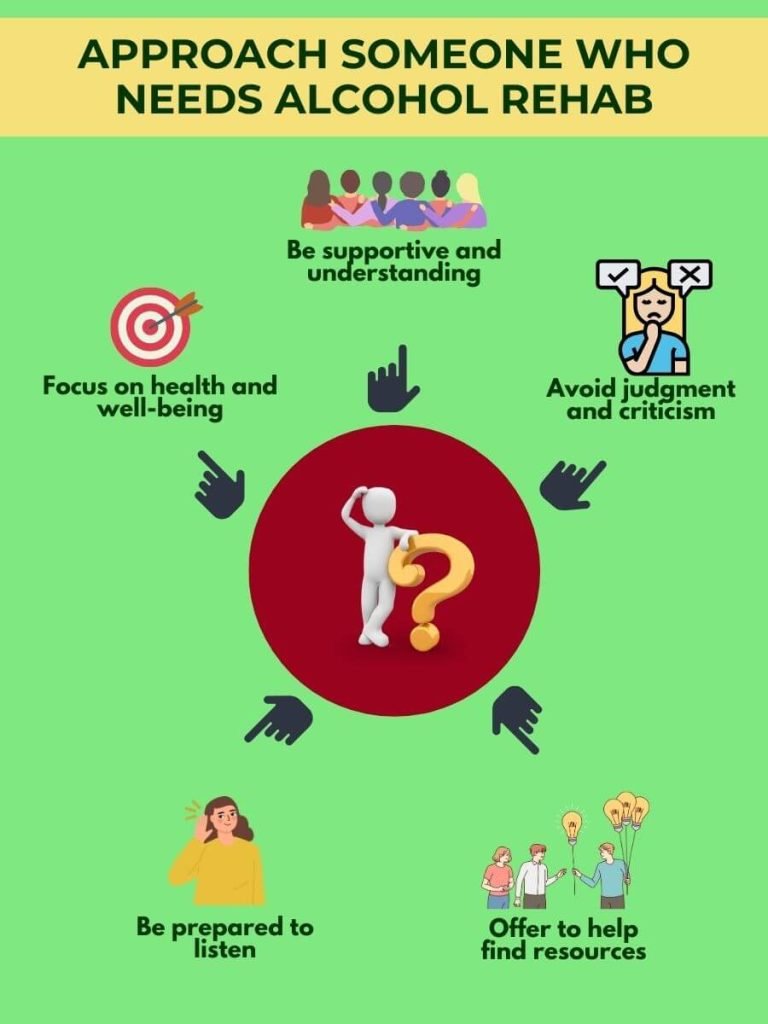It’s not an easy task to talk to someone about alcohol addiction. Particularly when they don’t realize that it’s time they need to go to rehab. Only about 8% of the 15 million persons in the United States who suffer from Alcohol Use Disorder (AUD) actually seek treatment for their condition.

What if you’re a worried family member or friend? This guide gives you the information and tools you can use to approach the problem with kindness, which will help your loved one get better.
Approach Someone Who Needs Help With Alcohol Rehab

Approaching someone to talk about their alcohol addiction could be the main initiative for them in the way of getting into rehab. When my father used to be an alcoholic, my family struggled a lot just to start the conversation. We hesitated, but eventually, talking came out to be the most reliable way tp approach him about alcohol rehab.
I have seen so far that people should be kind and thoughtful when they talk about the subject with their loved ones about their addiction. Here are some ideas on how to approach someone who needs help with alcohol rehab-
Be supportive and understanding
Approaching someone who needs help with alcohol addiction starts with empathy. Show them that you care about them and their well-being. Tell them you’re not there to judge or criticize them but to help. This approach can help them trust you and let you talk deeply about their problems.
Avoid judgment and criticism
When talking to someone about alcohol addiction, it’s important to avoid judgement and criticism. When someone is condemned, it can make them deny or defend themselves even more. Instead, pay attention to their healing path and remind them that everyone makes mistakes. Don’t get angry during the talk; make it clear that your concern comes from love.
Focus on the person’s health and well-being
You should focus on the person’s health and well-being. Talk about the bad effects that drinking has had on their life, both mentally and physically. You can get them to think about getting professional help to improve their quality of life by telling them how good rehab is for their health.
Be prepared to listen
Listening is important. Let them share their thoughts, feelings, and experiences in a safe place. If you listen to them without passing judgement, they may feel understood and encouraged, which may make them more likely to think about going to rehab.
Offer to help find resources
One useful way to show support is to offer to help them find resources. Do some research ahead of time on rehab centers, support groups, and therapists in the area so you can give them immediate choices if they say they want to get help. This proactive stance can help them take that important first step towards healing.
Signs That Someone Needs Alcoholic Rehab
Some of the most important things in your life may be suffering because of your drinking: relationships, family, work, health, faith, and so on. These could be signs that you need alcohol rehab.
Let’s get familiar with some signs that will make you realize that someone needs alcohol rehab-
Physical Signs
- Changes in appetite or weight: A sudden drop or gain in weight could be a sign of alcohol abuse
- Shakiness or tremors: Excessive alcohol can make you shake uncontrollably
- Nausea or vomiting: Regular bouts of sickness or vomiting may be caused by drinking alcohol.
- Fatigue: Excessive drinking often leads to chronic fatigue.
- Headaches: Headaches can be light or severe, and women are more likely than men to get them as a sign.
Behavioral signs
- Changes in mood or personality: Big changes in mood or personality may be a sign of drinking problems.
- Problems at work or school: A drop in performance and attendance could be a sign of problems caused by drinking.
- Withdrawal from friends and family: Being alone and avoiding people you care about is a worrying sign.
- Increased risk-taking behaviors: Anyone acting carelessly while drunk is a red flag.
- Legal problems: Getting in trouble with the law a lot because of drinking is a sign of a serious problem.
Alcohol-related health problems
- Liver disease: Jaundice, cirrhosis, or fatty liver may develop because of alcoholism. According to Professor Mathew Vadas, Executive Director of the Centenary Institute, University of Sydney, alcoholic liver disease is the main reason people die from drinking, and it’s also responsible for 50% of liver diMathew Vadasseases and 15% of all liver transplants.
- Heart disease: Heart problems can happen when you drink too much. In fact, alcohol is a major risk factor for high blood pressure (hypertension).
- Mental health problems: Drinking to excess frequently has a compounding effect on mental health issues such as depression and anxiety.
How Do I Raise The Topic?
You need to do some work to learn how to talk to someone about alcohol addiction. You might fail if you don’t prepare for the talk because you won’t know what to say or how to react. These tips can help you get ready for the best talk possible-
Choose the right time and place
Talking to your loved one about alcohol addiction at the right time and place is crucial for effective communication. Waiting until they are intoxicated may not be effective. Choose a calm, private environment like their home or apartment rather than a noisy public place to ensure a meaningful discussion.
Be direct and honest
Have a direct and honest talk with your loved one about your worries about their drug use. Be willing to listen and not judge. Remember, you have to be polite along with being direct. The chances of a good outcome depend on how and when you have the talk.
Be supportive and understanding
As long as you are there for them and support them with respect, they might eventually open up to you about their problem and how they need help. This will simplify the whole process and get rid of the need for an intervention.
Be prepared to listen
Listening to what the other person has to say is a big part of talking to them. If someone with an addiction tells you something, try to listen without criticizing. Not judging what they say is important, even if you disagree sometimes.
Don’t force the issue
Be patient, and don’t force your loved one to answer right away. Trying to force them to decide what to do next will probably not go over well. People don’t like being told they’re doing something wrong. Eventually, they might not feel as hurt and betrayed. Just let them have time and room to get to this point on their own.
People Also Asked
What to do if your friend is addicted to drugs?
Try to handle the situation with care and understanding. Say what’s bothering you and give support without judging. Tell them to get help from a professional or go to support groups. Recovery is a process that is unique to each person. The fact that you will always be there for them can make a big difference in how ready they are to get help.
What if an alcoholic doesn’t want help?
It’s a very common situation. Keep talking about how worried you are and sharing information about how treatment can help. You might want to plan an intervention with the help of pros or talk to support groups for advice. In the end, the person must decide when they are ready for care, but your ongoing support may affect that choice.
With the right advice and love, family and friends can help someone take the first step towards healing by getting them to treatment. It’s important to think about what they need and gently persuade them. Recovery is possible if they are determined and ready to change. Know if you need support groups after alcohol rehab.
- What to Pack for 30-Day Rehab? FREE Checklist - May 30, 2024
- Types of Outpatient Rehab: Difference One Should Know - March 28, 2024
- Truth Behind FMLA: Hidden Hurdles of Alcohol Rehab Leave - March 28, 2024